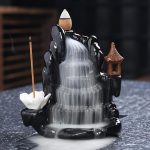The practice of burning incense has a long history, entwined with religious rituals and spiritual practices across many cultures. However, when it comes to Christianity, the question often arises: is burning incense a sin, as defined by the Bible? To answer this, we must delve into the biblical context of incense, its use in ancient Israel, and how it relates to Christian worship today.
Incense in the Old Testament
The Old Testament provides several instances of incense being used in worship. It was a crucial component of the tabernacle and later the temple, specifically in the holy place. God gave detailed instructions to Moses about the composition and use of incense. It was to be burned continuously on the altar of incense, a sacred act symbolizing the prayers of God’s people ascending to heaven.
However, the Bible also warns against the misuse of incense. When the Israelites turned to idolatry, they often burned incense to false gods. This practice was strongly condemned as a sin. The prophets Isaiah and Jeremiah criticized the people for offering meaningless rituals, including incense, while neglecting justice and righteousness.
Incense and the New Testament
The New Testament paints a different picture. The temple veil was torn at Jesus’ death, symbolizing the removal of barriers between God and humanity. This event has led many Christians to believe that the Old Testament laws, including those about incense, are no longer binding.
The focus shifts from physical rituals to the spiritual worship offered through Jesus Christ. While the Bible does not explicitly condemn burning incense in personal settings, it emphasizes the importance of worship in spirit and truth.

Incense in Christian Practice Today
The use of incense in Christian worship varies widely among denominations. Some churches, particularly those with liturgical traditions, continue to use incense as a symbolic representation of prayer ascending to God. They often draw inspiration from the Old Testament practice while emphasizing its spiritual significance.
On the other hand, many churches have chosen to discontinue the use of incense. They believe that worship should be simple and focused on the Word of God and the Holy Spirit. For them, incense might be seen as a distraction or even a form of idolatry.

Balancing Perspectives
So, is burning incense a sin? The answer is not straightforward. The Bible clearly condemns the misuse of incense in idolatry. However, it also acknowledges its legitimate use in worship. The key lies in one’s motives and understanding.
If burning incense helps individuals connect with God and deepen their spiritual lives, it can be a meaningful practice. However, it’s essential to avoid treating incense as a magical object or relying on it as a substitute for genuine faith and obedience.
Ultimately, the decision to burn incense is a personal one. Christians should be guided by their conscience and the teachings of the Bible. It’s important to remember that the heart of worship is not about external rituals but a genuine relationship with God.

Revelation 8:3-4 – Incense and Prayers
Revelation 8:3-4 presents a powerful and symbolic image of worship and intercession. It reads:
“And another angel came and stood at the altar with a golden censer, and he was given much incense to offer with the prayers of all the saints on the golden altar before the throne. And the smoke of the incense, together with the prayers of the saints, rose before God from the angel’s hand.”
This passage connects the imagery of incense with the prayers of God’s people. The angel, representing Christ or the Holy Spirit, offers the prayers of the saints to God. The incense serves as a symbolic representation of these prayers, ascending before God’s throne like fragrant smoke.
The Symbolism of Incense
As discussed earlier, incense held significant meaning in ancient cultures. It was often believed to purify the air, create a sacred atmosphere, and facilitate communication with the divine. The biblical use of incense reflects and expands upon these concepts.
In Revelation, the incense symbolizes the prayers of the saints. It suggests that our prayers, when offered in faith, are precious and acceptable to God. The image of the smoke ascending conveys the idea that our prayers reach the heavenly throne and are heard by God.
Intercession and Mediation
The angel’s role in offering the incense and prayers emphasizes the concept of intercession. Just as the angel acts as a mediator between God and humanity, Jesus Christ is our ultimate intercessor. He presents our prayers to the Father, making them acceptable and effective.
This passage reinforces the importance of prayer and intercession in the Christian life. We are encouraged to pray without ceasing, knowing that our prayers are heard and answered according to God’s perfect will.
The Worshipful Aspect
The scene depicted in Revelation 8:3-4 is also profoundly worshipful. The golden altar, the incense, and the angel’s actions create a picture of reverence and adoration. It reminds us that worship and prayer are interconnected. As we approach God in worship, our hearts are opened to pour out our prayers and petitions.
Revelation 8:3-4 offers a rich and symbolic understanding of incense and its connection to prayer. The imagery conveys the power and efficacy of our prayers, presented to God through Christ, our great High Priest.

Incense in Idol Worship and Pagan Practices
The allure of incense lies in its ability to create atmosphere and evoke spiritual feelings. Its aromatic qualities have made it a staple in religious practices across cultures for millennia. However, the Bible provides a stark contrast between the legitimate use of incense in worship and its misuse in idolatrous practices.
Incense in Pagan Worship
Before delving into biblical perspectives, it’s essential to understand the prevalence of incense in ancient pagan religions. These cultures often believed that smoke carried prayers and offerings to the gods. Incense was seen as a sacred substance, capable of purifying spaces and connecting humans with the divine realm.
Many pagan rituals involved burning incense as part of the worship experience. The aromatic smoke was believed to please the deities, creating a favorable atmosphere for communication. This practice was deeply ingrained in the religious life of these societies.
The Biblical Perspective
The Old Testament provides a nuanced view of incense. While it was a prescribed element in the tabernacle and temple worship, its use was strictly regulated. God outlined specific instructions for its composition and use, emphasizing its sacred nature. The incense burned on the altar represented the prayers of God’s people ascending to heaven.
However, the Bible also forcefully condemns the use of incense in connection with idolatry. When the Israelites turned away from God and worshiped false deities, they often adopted the pagan practice of burning incense to these idols. The prophets fiercely denounced this as a gross sin, equating it with spiritual adultery.
Isaiah, for instance, rebuked the people for offering meaningless rituals, including incense, while neglecting justice and mercy. Jeremiah similarly criticized the burning of incense to the queen of heaven as a provocation of God’s wrath.
The Dangers of Imitation
The Israelites’ tendency to imitate pagan practices serves as a cautionary tale for believers today. While the Old Testament law may not have the same binding force as it once did, the underlying principles remain relevant.
Idolatry, in its broadest sense, is about placing anything or anyone above God. Even well-intentioned practices can become a form of idolatry if they distract from or replace a genuine relationship with God.
A Balanced Approach
It’s crucial to avoid generalizations about incense. Its use in itself is not inherently sinful. The problem arises when it becomes an object of worship, a substitute for God, or a means of manipulating spiritual forces.
For some Christians, incense can be a meaningful tool for worship, evoking a sense of reverence and awe. However, it’s essential to ground its use in biblical theology and avoid falling into the traps of superstition or ritualism.
The history of incense is intertwined with both sacred and profane practices. While the Bible acknowledges its legitimate use in worship, it also provides stern warnings against its misuse in idolatry.
Christians today must exercise discernment when considering the use of incense in their spiritual lives. The focus should always be on cultivating a genuine relationship with God, rather than relying on external rituals or objects. By understanding the historical and biblical context, believers can make informed decisions that honor God and promote spiritual growth.
The question of whether burning incense is a sin in the Bible is complex and multifaceted. While the Old Testament provides both positive and negative examples of incense use, the New Testament offers a different perspective on worship.
Christians today have the freedom to decide whether or not to incorporate incense into their spiritual practices. The most important factor is maintaining a pure heart and focusing on worshiping God in spirit and truth.
Rather than getting caught up in debates about specific practices, believers should strive to cultivate a deep and abiding relationship with God, allowing their faith to guide their actions and decisions.











